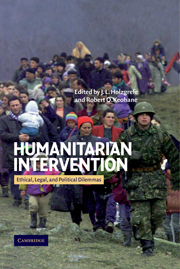Book contents
- Frontmatter
- Contents
- List of contributions
- Acknowledgments
- Introduction
- PART I The context for humanitarian intervention
- PART II The ethics of humanitarian intervention
- PART III Law and humanitarian intervention
- PART IV The politics of humanitarian intervention
- 8 Political authority after intervention: gradations in sovereignty
- 9 State failure and nation-building
- Select English language bibliography
- Index
9 - State failure and nation-building
Published online by Cambridge University Press: 27 July 2009
- Frontmatter
- Contents
- List of contributions
- Acknowledgments
- Introduction
- PART I The context for humanitarian intervention
- PART II The ethics of humanitarian intervention
- PART III Law and humanitarian intervention
- PART IV The politics of humanitarian intervention
- 8 Political authority after intervention: gradations in sovereignty
- 9 State failure and nation-building
- Select English language bibliography
- Index
Summary
During the Cold War, the chief threat to human rights came in the form of state tyranny in the Soviet bloc and in authoritarian regimes receiving American support. After 1991, with the end of imperial support for client states and satellites, together with the national independence of groups held in imperial tutelage, there has been an explosion of state formation and state fragmentation. Since 1991 more than fifteen new states have emerged, and while some have made the transition to stability, many of them, Georgia and Armenia for example, are struggling, others like Chechnya are staging a secessionist war that is being brutally put down, while other ex-Communist survivors like Yugoslavia have broken apart. Where states cannot control their territory and are fighting insurgencies or ethnic separatism, massacre and ethnic cleansing become ways of life. As a result, chaos has replaced tyranny as the new challenge to human rights in the twenty-first century.
Some states are struggling to be born, while others that had benefited from imperial assistance, like Somalia, have collapsed altogether. Still others, like the Democratic Republic of Congo, remain states in name only. Sierra Leone has been torn apart by a civil war fomented by its neighbor Liberia, and in Afghanistan, the state was first dismembered by a civil war and then taken over by a terrorist group. In other places, collapse has not essentially been driven by imperial departure or conflict.
- Type
- Chapter
- Information
- Humanitarian InterventionEthical, Legal and Political Dilemmas, pp. 299 - 321Publisher: Cambridge University PressPrint publication year: 2003
- 23
- Cited by



